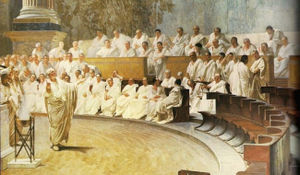Template:Conscripted fathers: Difference between revisions
No edit summary |
No edit summary |
||
| Line 1: | Line 1: | ||
[[File:senaterome.jpg|right|thumb|300px|In [[Rome]] birth [[Birth registration|certificates]] were kept in the [[Temples|Temple of Saturn]] by order of the [[Senate]] who were the [[Conscripted fathers]] of the people. As the civil [[fathers]] and [[benefactors]] of the people they offered many [[benefits]].]] | [[File:senaterome.jpg|right|thumb|300px|In [[Rome]] birth [[Birth registration|certificates]] were kept in the [[Temples|Temple of Saturn]] by order of the [[Senate]] who were the [[Conscripted fathers]] of the people. As the civil [[fathers]] and [[benefactors]] of the people they offered many [[benefits]].<Br>How does the state acquire the power of the natural father? <Br>It is the establishment of a system of "[[legal charity]]" through the [[welfare State]] which degenerate the character of the [[masses]]. The willingness to [[bite]] one another because of an [[appetite]] for the [[dainties]] of these [[conscripted fathers]] the people have been [[snare|brought back into]] the [[bondage of Egypt]]".]] | ||
== Conscripted Fathers == | == Conscripted Fathers == | ||
Latest revision as of 17:09, 1 August 2022

How does the state acquire the power of the natural father?
It is the establishment of a system of "legal charity" through the welfare State which degenerate the character of the masses. The willingness to bite one another because of an appetite for the dainties of these conscripted fathers the people have been brought back into the bondage of Egypt".
Conscripted Fathers
Conscripti Patri or Patres conscripti or Conscripted Fathers
The Conscripti Patri was a Latin idiom that described the Senate of Rome and eventually the entire legislature. It was a part of the principle of the Patronus or Parens Patriae of government.
Parens Patriae [Latin, Parent of the country.] A doctrine that grants the inherent power and authority of the natural father to the state to protect persons who are legally unable to act.
The present Senate and Congress or in some countries the parliament act as the fathers of the people who have shown themselves as dependent upon the State for its benefits.
Conscripti Patri were also known as the fathers of the earth which we see mentioned by Jesus in the New Testament.
- Matthew 23:9 "And call no [man] your father upon the earth: for one is your Father, which is in heaven."
Understanding why Jesus said this will bring the Bible and its message into focus with modern times.